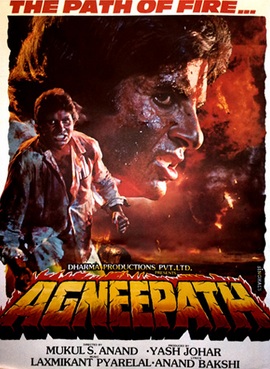He leans against the side of his chair and lets one hand dangles at the back. The baritone is familiar but a little hoarse, "Vijay Deenanath Chavan, poora naam!" (Vijay Deenanath Chavan, full name!) And that's what Agneepath, starring Amitabh Bachchan, is all about.
The
recent remake forced me to review the original movie 22 years after its
release. Movies like Agneepath should be better left untouched. They
serve well as inspiration to the people in the film industry.
The story
is nothing new. A retired teacher, Deenanath Chavan, lives happily with
his family, in a village called Mandua near Bombay. His son and the
villagers look up to him. One incident brings him in direct
confrontation with the ambitions of a mafia don Kancha Cheena.
Deenanath's fate changes overnight. His family is shunned. Vijay loses
his childhood and lets anger fills in the void. Revenge drives him away
from home into the arms of the underworld. Sounds familiar!
What
makes Agneepath different is the detailing that goes into it. The
transformation in the young Vijay gradually buids up. So first you've
the smile going away, then the gait changes, and finally he starts
talking like an angry young man. The character of the grown up Vijay
never smiles in the movie. And when he does, it has sarcasm written all
over it.
The
director, late Mukul S. Anand, executes the concept exceptionally well.
Whether it's the camera zooming in to introduce the underbelly of Bombay
in the 90s or the fight sequences, especially the climax, there's a
certain grandeur about it all. Anand tries a lot of innovative camera
angles, something which would become his trademark in times to come.
Praveen Bhatt's cinematography is just an extension of this vision.
The
screenplay by Santosh Saroj and Kader Khan adds aura to the movie. The
one liners of Kancha Cheena have an evil wisdom written in them. The
understated confrontational scenes between Vijay and his mother reminds
you of Deewaar. In fact Vijay Chavan's dialogues carry a deeper meaning.
In one scene, the village baddie unknowingly talks to Vijay about his
past and Vijay has only this to say, "Topi Sambhalon Dinkar Rao, hawa tej chalta hai!" (Hold on to your cap tight Dinkar Rao, it's blowing fast) An obvious reference to the winds of change.
The theme
music by the French composer Jean Michel Jarre is a class act. There's
nothing much to write about the songs. The duo of Lakshmikant-Pyarelal
lets down.
There are
quite a few fine individual performances. Rohini Hattangadi as Vijay's
mother is restrained yet brilliant. Danny Denzongpa as Kancha Cheena
gives a glamourous touch to the mafia kingpin, something which even
Vijay acknowledges in the movie. Mithun Chakraborty as Krishnan Iyer
M.A. was lovable, maybe a little loud at times but overall entertaining.
Even the smaller roles played by Alok Nath (Vijay's dad), Madhavi
(wife), and Vikram Gokhale (Police Commissioner) leave a mark.
A special
mention must be made of Master Manjunath who plays the young Vijay. It
was a difficult film for the star of the TV series 'Malgudi Days'. He
delivers a mature performance. Way ahead of his 14 years.
For any
other actor it would have been a career defining role, but for Bachchan,
a monumental task to match the brilliance of another Vijay he played 15
years back in the cult classic Deewaar. He somehow manages to do it all
again. In Vijay Chavan, Amitabh Bachchan has produced Hindi cinema's
most iconic character of the last two decades.
The
screen lights up every time Bachchan walks in as Vijay Chavan. His
character has a lot of depth to it. In a hospital scene an angry Vijay
first shouts as a don and the next moment pleads as a son, "Ye maan ka achcha beta hai doctor. Tum kuch karo." (He's a good son doctor, please do something.) He communicates his own predicament so eloquently.
Bachchan
even modulated his voice for the role. It makes the character look even
more authentic. Pity they had to revert to the original voice in the
later release.
There are
no whistles and claps for this effort, simply awe and respect. Take a
bow Mr Bachchan, there's nothing close to this one since Deewaar.

No comments:
Post a Comment